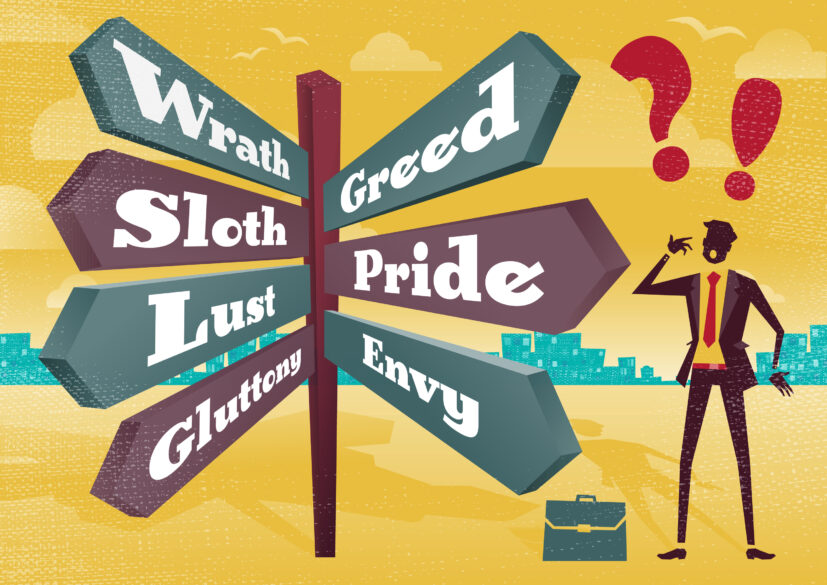Reflections on Life
By Melvin Arrington
Why does no one want to talk about sin these days? Why do people refuse to admit to wrongdoing anymore. The prevailing philosophy seems to be one of “I’m okay; you’re okay.” However, Scripture teaches that “if we say we have no sin, we deceive ourselves, and the truth is not in us.” (I John 1:8) We are all guilty as charged, every single one of us: “All have sinned and fall short of the glory of God.” (Romans 3:23)

No matter how we classify it, sin involves disobedience; it is a transgression of God’s law. Some infractions are minor (venial); others sever our relationship with God and put our souls at risk (mortal). For the sin to be considered mortal it has to meet all of the following criteria: 1) it must involve grave matter, for example, when a person breaks one of the Ten Commandments or fails to perform works of charity as specified in the 25th chapter of Matthew; 2) the person must have full knowledge and awareness of the seriousness of the matter; 3) he must give full consent to what he is about to do; that is, his will must be unimpaired. At the risk of oversimplification, we might say that the mortal category applies when it deals with doing something that’s really bad, and the person realizes how serious it is, and he goes ahead and does it anyway. Not all our faults involve actions we take. They can include our thoughts and words as well. And when we recite the Confiteor, we acknowledge that we are responsible not only for the things we have done but also for what we have failed to do.
During the early Christian centuries, several attempts were made to catalog what became known as the seven deadly sins, also called the seven capital or cardinal sins. Evagrius Ponticus, a monk who lived in the fourth century, put together the first list, including in his compilation what he called eight evil thoughts that lead us into temptation. Others who followed in Evagrius’ footsteps produced registers alternating between seven and eight sins. At the end of the sixth century Pope Gregory I (Gregory the Great) composed a list of seven items that closely resemble the modern-day canon of deadly vices: anger, envy, lust, pride, gluttony, sloth and greed. Although the names used for denoting each of these may have varied across the ages, the transgressions themselves have remained the same. As Archbishop Fulton J. Sheen has remarked, there are no new sins; there are only new sinners.

Why do we sin in the first place? It’s because we’re all searching for happiness. But many are searching in all the wrong places. Instead of discovering the joy and contentment that come from having a deeply committed personal relationship with Jesus Christ, they grasp at the things the world has to offer – wealth, power, pleasure, fame, etc. These usually result in only short-term gratification and long-term unhappiness.
Every sin is an excess or a defect of something that is good. Not surprisingly, much of our modern secular culture is characterized by excess, self-absorption and perversion of the good. It tells us that the classic vices are not bad at all. In fact, they can be very good. What’s wrong, they say, with trying to get even with your enemy? Why feel guilty about accumulating as much wealth as possible without concern for the needs of the poor? What harm is there in having an occasional affair as long as no one gets hurt? What’s wrong is that in each case the ego is out of control. When the predominant attitude is one of “it’s all about me,” concepts such as forgiveness, generosity and sacrificial love get shoved out of the way.
So, how do we protect ourselves from enticements that may lead us astray? For a start, we can pray for an extra measure of grace to fight off temptation and make a conscious effort to avoid the near occasions of sin, that is, the things and places that can lead us away from God and His church. In addition, we should pray to St. Michael: “St. Michael the Archangel, defend us in battle. Be our protection against the wickedness and snares of the devil.” And then we should follow up our prayers by putting them into action, for example, involving ourselves in a variety of charitable activities.
Bishop Robert Barron recommends practicing what he calls the seven lively virtues in order to cancel out the deadly vices. In other words, we should counterbalance anger with forgiveness, correct envy with admiration, exchange lust for chastity, rectify pride with humility, renounce gluttony in favor of temperance, counter sloth with zeal, and replace greed with generosity. Performing these virtues will loosen the bonds of sin and allow us to once again experience the love of God flowing through us.
Imagine an oblong box with anger, envy and lust aligned along one side, pride positioned at the head, and gluttony, sloth and greed stationed along the other side. The box represents a coffin; inside lies the soul. These deadly vices are, in the words of Archbishop Sheen, the “seven pallbearers of the soul.” They lead us down, down into darkness, down into the depths of sadness and despair, down, down to the death of the soul!
Our contemporary culture tries to pound into us the notion that the virtues are old-fashioned and out of step. But we know better. We know that by praying and doing good works we can, through the grace of God, cancel out those vices that pose the greatest threat to our spiritual wellbeing. If we follow the virtues, they will become for us stepping stones leading upward – up to peace and contentment, up to the attainment of our heart’s innermost desire, up to everlasting joy, up, up to God!
(Melvin Arrington is a Professor Emeritus of Modern Languages for the University of Mississippi and a member of St. John Oxford.)
